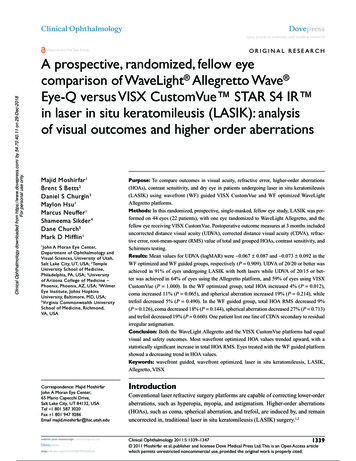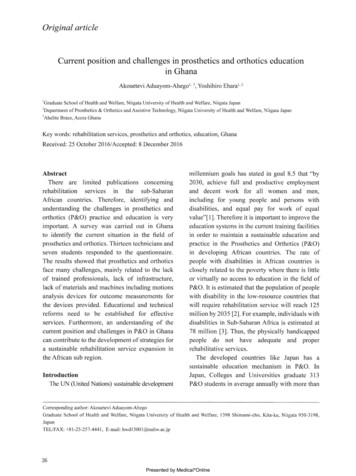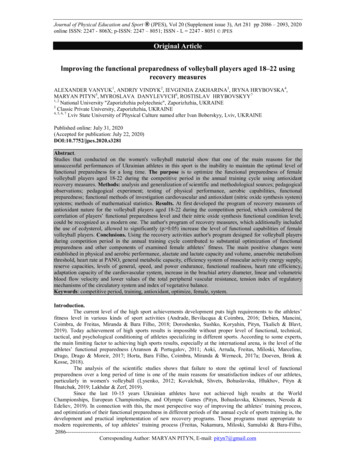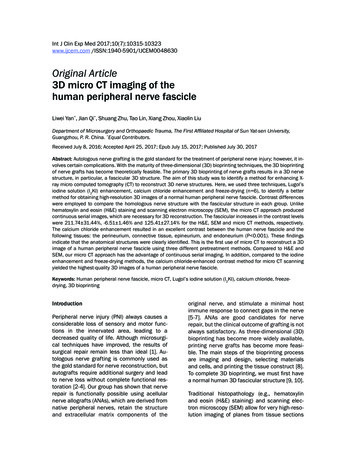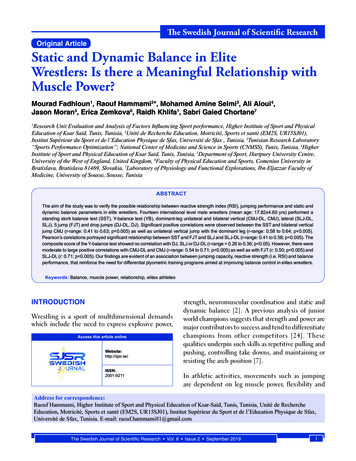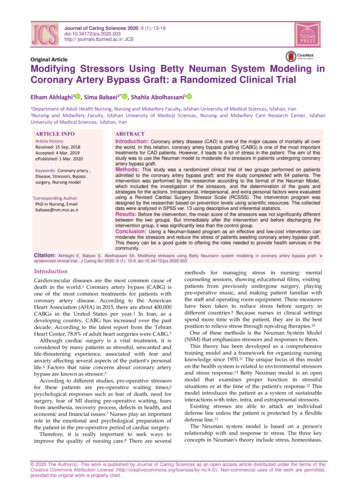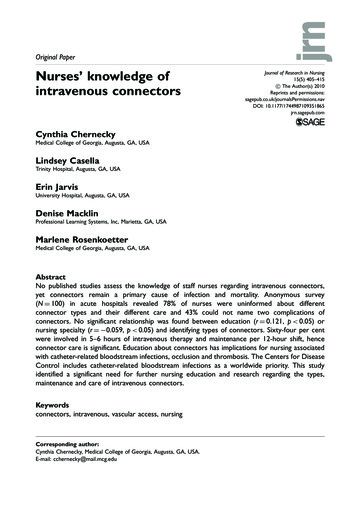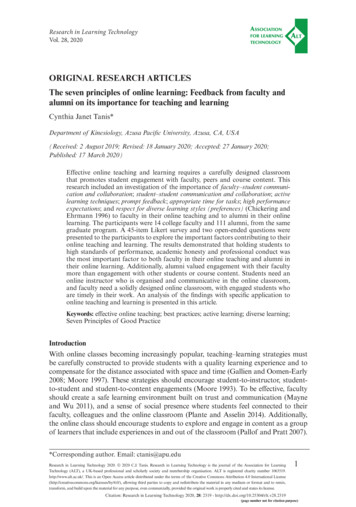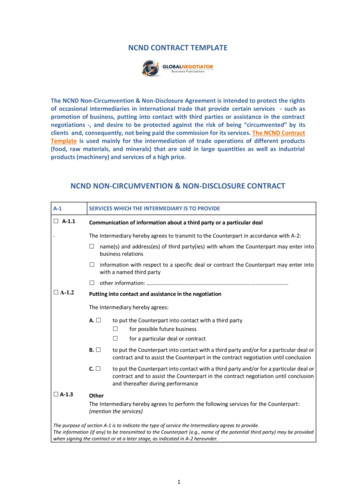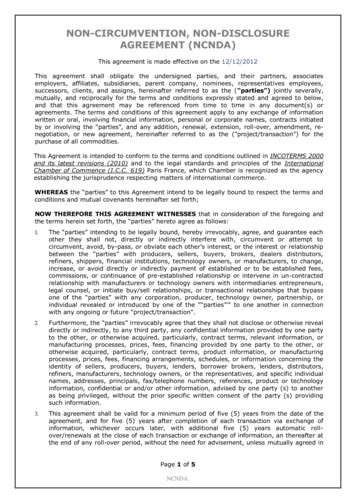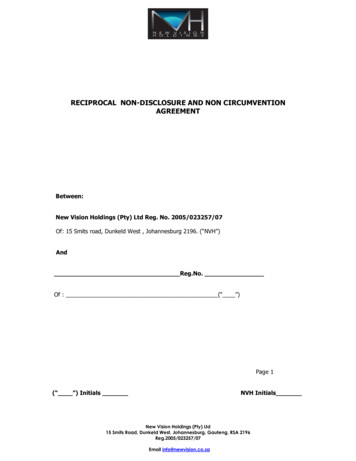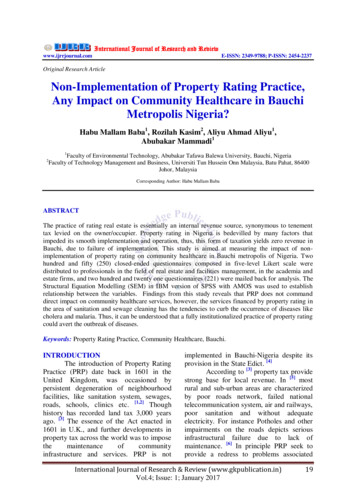
Transcription
International Journal of Research and Reviewwww.ijrrjournal.comE-ISSN: 2349-9788; P-ISSN: 2454-2237Original Research ArticleNon-Implementation of Property Rating Practice,Any Impact on Community Healthcare in BauchiMetropolis Nigeria?Habu Mallam Baba1, Rozilah Kasim2, Aliyu Ahmad Aliyu1,Abubakar Mammadi112Faculty of Environmental Technology, Abubakar Tafawa Balewa University, Bauchi, NigeriaFaculty of Technology Management and Business, Universiti Tun Hussein Onn Malaysia, Batu Pahat, 86400Johor, MalaysiaCorresponding Author: Habu Mallam BabaABSTRACTThe practice of rating real estate is essentially an internal revenue source, synonymous to tenementtax levied on the owner/occupier. Property rating in Nigeria is bedevilled by many factors thatimpeded its smooth implementation and operation, thus, this form of taxation yields zero revenue inBauchi, due to failure of implementation. This study is aimed at measuring the impact of nonimplementation of property rating on community healthcare in Bauchi metropolis of Nigeria. Twohundred and fifty (250) closed-ended questionnaires composed in five-level Likert scale weredistributed to professionals in the field of real estate and facilities management, in the academia andestate firms, and two hundred and twenty one questionnaires (221) were mailed back for analysis. TheStructural Equation Modelling (SEM) in IBM version of SPSS with AMOS was used to establishrelationship between the variables. Findings from this study reveals that PRP does not commanddirect impact on community healthcare services, however, the services financed by property rating inthe area of sanitation and sewage cleaning has the tendencies to curb the occurrence of diseases likecholera and malaria. Thus, it can be understood that a fully institutionalized practice of property ratingcould avert the outbreak of diseases.Keywords: Property Rating Practice, Community Healthcare, Bauchi.INTRODUCTIONThe introduction of Property RatingPractice (PRP) date back in 1601 in theUnited Kingdom, was occasioned bypersistent degeneration of neighbourhoodfacilities, like sanitation system, sewages,roads, schools, clinics etc. [1,2] Thoughhistory has recorded land tax 3,000 yearsago. [3] The essence of the Act enacted in1601 in U.K., and further developments inproperty tax across the world was to imposethemaintenanceofcommunityinfrastructure and services. PRP is notimplemented in Bauchi-Nigeria despite itsprovision in the State Edict. [4]According to [3] property tax providestrong base for local revenue. In [5] mostrural and sub-urban areas are characterizedby poor roads network, failed nationaltelecommunication system, air and railways,poor sanitation and without adequateelectricity. For instance Potholes and otherimpairments on the roads depicts seriousinfrastructural failure due to lack ofmaintenance. [6] In principle PRP seek toprovide a redress to problems associatedInternational Journal of Research & Review (www.gkpublication.in)Vol.4; Issue: 1; January 201719
Habu Mallam Baba et al. Non-Implementation of Property Rating Practice, Any Impact on CommunityHealthcare in Bauchi Metropolis Nigeria?with neighbourhood facilities, by generatingrevenue to defray cost of maintainingneighbourhood facilities and infrastructures.jurisdiction due to financial constraints andconstitutional limitations. [16, 17][7-9]LITERATURE REVIEWMajor Components of Property RatingThe key components makingpropertyratingexerciseare:thereconnaissance survey for the purpose ofidentification of properties in the area;enumeration of rateable hereditaments; mainrating valuation using field data of thesubject properties and compilation ofvaluation list; [2] the main aim of rating is tosupplementlocalrevenueforneighbourhood facilities and servicesprovision.PRPhasinherentlyaccommodated all relevant components ofany good tax system; for instance, forproperty taxation to achieve positive impact,it requires 1. Equitability – that procedure ofrate assessment should be fair, just and easyto understand; it should consider the localeconomy of the community as well asproperty value; 2. Viability – that the cost ofthe exercise must not outweigh the expectedrevenue, so that the revenue can financecommunity infrastructure and services; 3.Convenience – that the rate liability shouldbe affordable; 4. Full identification anddefinition of tax object; and 5. Appropriatepenalty prescribed to defaulters, consideringability to pay, benefit to be derived, timeand manner of payment. [2]Neighbourhood Facility ProvisionNeighbourhood facilities comprisesof general infrastructure, facilities andservices like hospital, roads, water,electricity, communication, schools andregular sanitation which is a prerequisite forpublic hygiene. The provision of communityinfrastructure, facilities and services isdependent on the availability of funds eitherfrom central government or locallygenerated revenue. Property tax as a localsource of revenue is imposed in order tosupplement fund for local communitywelfare development. Whether in the nameof rating or otherwise, community membersare obliged to come together and raisemoney for local development, as in [18]The occurrence of epidemic likecholera and malaria diseases are associatedwith poor public hygiene; lack of propersanitation on waste waterways and refusecollection centres is a major cause of healthrisk to communities. [10] The practice ofproperty rating in principle is aimed atfinancingallcommunitywelfareprogrammes like sanitation services andinfrastructure provision. [11, 12] A direct orindirect link can be established betweenproperty rating practice and communityhealthcare; this is one of the purposes of thisstudy.The preventive aspect of infectiousdiseases entails community sanitationmobilized at community level and financedby community-owned resources; one of theguiding principles for achieving success isby community engagement in design,implementation and monitoring. [13]Property rating tends to integrate localcommunity in participating by contributingtoward community maintenance, poor ortotal absence of community participationdetracts healthcare delivery. [14, 15]Local governments are obliged toprovide some neighbourhood facilities andservices at local level basically using fundobtained from three key sources, these are;federal allocation, internally generatedrevenue and grants. Direct allocation fromfederal government is always the highestnevertheless not sufficient to develop andmaintain all neighbourhood facilities andservices while the two other sources aregrossly inadequate; some of the internalrevenues like property rating is not imposeddespite the financial deficit in Bauchimetropolis, thus most neighbourhoodfacilities and services like sanitation are notwell maintained. Going by the federalstructure of government, local governmentsare restrained from making spontaneousfiscal plan for their respective area ofInternational Journal of Research & Review (www.gkpublication.in)Vol.4; Issue: 1; January 201720
Habu Mallam Baba et al. Non-Implementation of Property Rating Practice, Any Impact on CommunityHealthcare in Bauchi Metropolis Nigeria?funds are locally raised to provide water,roads, drainage and sanitation services insome neighbourhoods in Tanzania.Property tax in principle is link tothe provision of local infrastructure andservices since 1601 when The Poor ReliefAct or The Statute of Elizabeth was enactedin United Kingdom to overcomedeteriorating community infrastructure andservices. [1] Property tax generates fund forinfrastructure and services at municipallevel, however this tax is not well-harnessedin developing nations; [19] the tax in relationto GDP is 0.6% in developing countries,compared to 2.1% in OECD countries, [20] in[21]the percentage of property tax to GDP inmost African countries is less than 0.5%.This therefore indicates that the tax does notcontribute significantly to local governmentfinance; the non-implementation of thisform of tax in Bauchi metropolis confirmszero per cent contribution to the municipalauthorities.SanitationSome neighbourhoods in themetropolis are characterized by rampartlittering of refuse, unclean drainages,unorganized waste accumulation; in Turaki(1982) cited in [22] that in the high, mediumand low density areas of Bauchi metropolis,an average of 0.004m3/person/day of solidwaste was generated, while Maikano (2000)cited in [22] reported an average of0.0073m3/person/day of solid waste wasgenerated in Bauchi, however [22] reportedan average of 0.0083m3/person/day, thisindicates a slight increase in the volume ofsolid waste generation; the main problem isirregular evacuation of waste from thecentres and lack of household refusecollection bins and incinerators.There are few refuse collectioncentres, and with rapid urban sprawl andpopulation surge, more refuse collectioncentres unofficially emerged with scatteredrefuse in areas not designated as collectionpoint. [23] The Bauchi State EnvironmentalProtection Agency (BASEPA) is the onlybody charged with the responsibility ofevacuating waste in Bauchi metropolis,however, lack of household bin for eachhousing unit and inaccessible nature ofsome of the narrow roads in the metropolismakes it difficult to access some remoteareas, even on accessible street there arerefuse accumulations that many timesoverlaps over the tarred road due toirregular evacuation. [23, 24]Part of the solid waste and otherrefuse end up into the sewers and drainages,thereby blocking rain water from drainingaway, some streets and residences are oftenflooded annually in Bauchi metropolis,while remnant rain water breeding harmfulinsects and cause diseases. [25] Flood is oneof the natural disasters in Nigeria, about 750houses in Bauchi State are washed away byflood in 1988. [26] Floods are commonphenomenon during rainy season in Nigeria.[27]Dumping of refuse in drainage coupledwith the usual torrential rainfall, is a majorfactor that causes flooding in the ndpursuedseveralprogrammes on sanitation like CommunityInspection Programme, Tax Force onEnvironmentalSanitationin1986,Operation Keep Bauchi Clean and theongoing BASEPA. The Bauchi State UrbanDevelopment Board and the municipalauthority are expected to take a leading rolein sanitation, community welfare anddevelopment; these are some of the statutoryduties carried out by local authorities asenshrined in the 1979 and 1989constitutions (Decree No. 12 of 1989) ofNigeria; Bauchi metropolis has refrainedfrom refuse collection mainly due to fundconstraint and lack of refuse collectionvehicles, [23] The aesthetic environmentalquality in the metropolis is affected by poorand irregular sanitation programme.BASEPA is funded by the stategovernment even though the funding is notsuffice enough, National Ecological Fundsometimes assist BASEPA; the Agency orthe local government do not raise revenuefrom property tax as this source of internalrevenue is not implemented in BauchiInternational Journal of Research & Review (www.gkpublication.in)Vol.4; Issue: 1; January 201721
Habu Mallam Baba et al. Non-Implementation of Property Rating Practice, Any Impact on CommunityHealthcare in Bauchi Metropolis Nigeria?metropolis [29] thus, it operates in difficultfinancial situation. [23, 24]Refuse disposal in the areas underconsideration is imminent and evacuationtakes long time before it is done, therebyresulting to the incidence where part of thestreet is pervaded with refuse leading tooccurrence of road accidents; sewages areoften blocked by chunk of refuse thusaccumulated water in the gutter breedmosquitoes and other harmful insects. Theseare some of the community problems thathinders better welfare of the people in thecommunity. The general welfare can onlybe improved when adequate funds arespontaneously generated and made availablefor community development programme;property rating practice (PRP) is a simpleand most reliable local revenue aimed atimproving community welfare. [30, 9]Some edible materials like roasted meat andthe famous „pure water‟ are readily consumeon the move, the containers are discardedand blown around by wing, therebyrevealing negative aesthetic scenery of themetropolis, as in [31] littering as a result offood items packaged in a kind of disposablecontainers such that the food are consumedon the move accelerates the problem. Thecharacter of domestic refuse and wasteproblemhasbecomeaseriousneighbourhood problem due to improperdisposal and collection where in manyinstances refuse is dump by the road andculvert side. [32, 33]In [34] there is poor and ineffectivewaste management from the side of thegovernment and the citizen, however, in [35]argued that the whole scenario is driven severalneighbourhood services that needs localintervention, like sanitation, evacuation ofdrainages to open up water ways, accordingto [23] Bauchi metropolis has generated133,531 tons of solid waste in 2000 alone,some of the waste end in the water ways andcausing flood in the metropolis.Themotivatingfactorsthatnecessitate the need for implementing PRPis to overcome sanitation problem andfinance local services. It is a common sightto see blocked sewages without beenevacuated, stockpile of waste at collectioncentres, refuse littering and poor wastemanagement. [36,37] Given the relativecalmness in Bauchi compared with someneighbouring States, there is a continuingsurge in population which unavoidablyexerts additional pressure on existingneighbourhoodfacilities;moredevelopments are needed to tackle lack ofinfrastructure and foster human capacitydevelopment; [38] reliable machinery shouldbe put in place to strengthen revenuegeneration for routine maintenance of thelocal facilities.In [39] property rate is one of thesources of internal revenue especially indeveloping countries, nevertheless, the taxhas contributed as much as 40% ofsubnational taxes in the 1990s; th
be improved when adequate funds are spontaneously generated and made available for community development programme; property rating practice (PRP) is a simple and most reliable local revenue aimed at improving community welfare. [30, 9] Some edible materials like roasted meat and the famous „pure water‟ are readily consume on the move, the containers are discarded and blown around by

